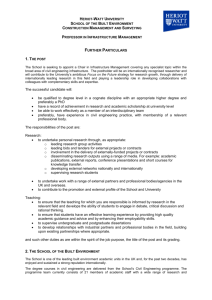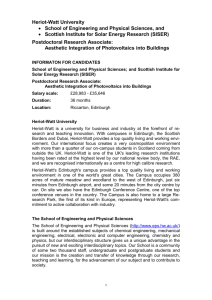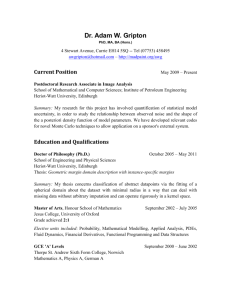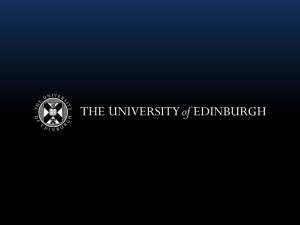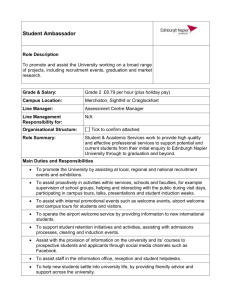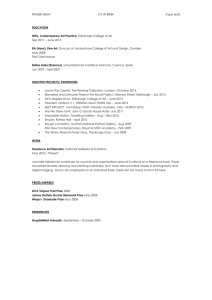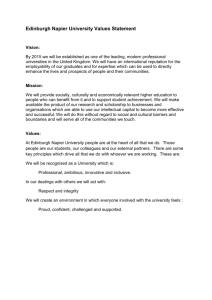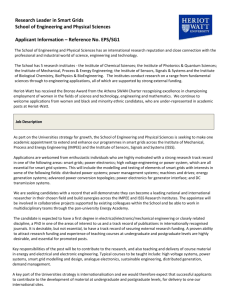4. General Information on Heriot
advertisement
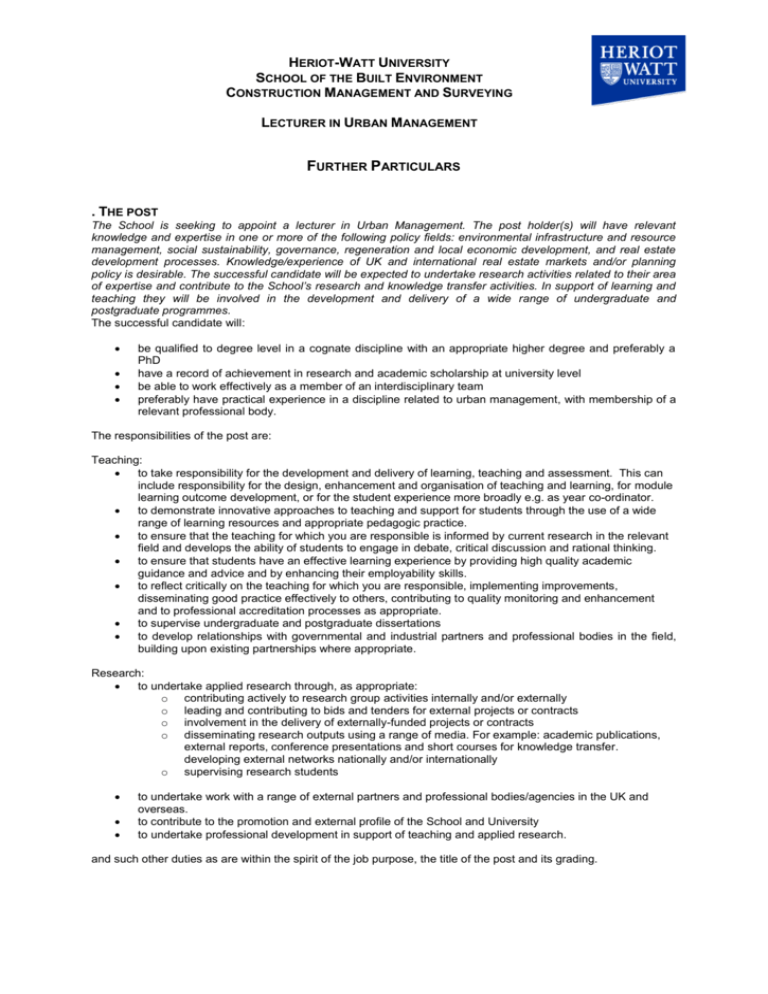
HERIOT-WATT UNIVERSITY SCHOOL OF THE BUILT ENVIRONMENT CONSTRUCTION MANAGEMENT AND SURVEYING LECTURER IN URBAN MANAGEMENT FURTHER PARTICULARS . THE POST The School is seeking to appoint a lecturer in Urban Management. The post holder(s) will have relevant knowledge and expertise in one or more of the following policy fields: environmental infrastructure and resource management, social sustainability, governance, regeneration and local economic development, and real estate development processes. Knowledge/experience of UK and international real estate markets and/or planning policy is desirable. The successful candidate will be expected to undertake research activities related to their area of expertise and contribute to the School’s research and knowledge transfer activities. In support of learning and teaching they will be involved in the development and delivery of a wide range of undergraduate and postgraduate programmes. The successful candidate will: be qualified to degree level in a cognate discipline with an appropriate higher degree and preferably a PhD have a record of achievement in research and academic scholarship at university level be able to work effectively as a member of an interdisciplinary team preferably have practical experience in a discipline related to urban management, with membership of a relevant professional body. The responsibilities of the post are: Teaching: to take responsibility for the development and delivery of learning, teaching and assessment. This can include responsibility for the design, enhancement and organisation of teaching and learning, for module learning outcome development, or for the student experience more broadly e.g. as year co-ordinator. to demonstrate innovative approaches to teaching and support for students through the use of a wide range of learning resources and appropriate pedagogic practice. to ensure that the teaching for which you are responsible is informed by current research in the relevant field and develops the ability of students to engage in debate, critical discussion and rational thinking. to ensure that students have an effective learning experience by providing high quality academic guidance and advice and by enhancing their employability skills. to reflect critically on the teaching for which you are responsible, implementing improvements, disseminating good practice effectively to others, contributing to quality monitoring and enhancement and to professional accreditation processes as appropriate. to supervise undergraduate and postgraduate dissertations to develop relationships with governmental and industrial partners and professional bodies in the field, building upon existing partnerships where appropriate. Research: to undertake applied research through, as appropriate: o contributing actively to research group activities internally and/or externally o leading and contributing to bids and tenders for external projects or contracts o involvement in the delivery of externally-funded projects or contracts o disseminating research outputs using a range of media. For example: academic publications, external reports, conference presentations and short courses for knowledge transfer. developing external networks nationally and/or internationally o supervising research students to undertake work with a range of external partners and professional bodies/agencies in the UK and overseas. to contribute to the promotion and external profile of the School and University to undertake professional development in support of teaching and applied research. and such other duties as are within the spirit of the job purpose, the title of the post and its grading. HERIOT-WATT UNIVERSITY SCHOOL OF THE BUILT ENVIRONMENT CONSTRUCTION MANAGEMENT AND SURVEYING LECTURER IN URBAN MANAGEMENT 2. THE SCHOOL OF THE BUILT ENVIRONMENT The School is one of the leading built environment academic units in the UK and, for the past two decades, has enjoyed and sustained a strong reputation internationally. The person appointed will will be expected to participate in the School’s teaching activities, undertake administration as required and contribute to the research portfolio of the School within a relevant research group. Undergraduate course provision The Urban Studies programme offers three BSc Hons undergraduate degrees, Real Estate Management, Planning & Property Development and Urban & Regional Planning. All of the above degrees are accredited by Royal Institution of Chartered Surveyors, with Urban & Regional Planning also accredited by the Royal Town Planning Institute. There is a considerable overlap between the various undergraduate courses within the programme that makes for both efficient delivery and provides the basis for future expansion of cross-disciplinary courses between other programmes in the School. Postgraduate course provision The Urban Studies programme currently offers postgraduate degrees in Housing & Regeneration, Housing Studies (Asia Pacific), Inclusive Environmental Access & Design, MRes Urban Studies Research, Real Estate Investment & Finance, Real Estate Management & Development, Real Estate & Planning, Urban Regeneration, Urban Regeneration & Real Estate Development and Urban Regional Planning. There are currently approximately 60 postgraduates studying at our Edinburgh and Dubai campuses, plus approximately 40 studying as distance learners either independently or through our international network of Academic Learning Partner institutions. All on-campus courses are taught across two semesters of one academic year and are completed by the student submitting a dissertation. Staffing The School has approximately 65 academic staff including 18 professors. The Urban Studies programme has a staff complement of 20 academics, including 6 professors, plus 9 ressearch staff, and is supported by computing officers, technicians, and administrative officers covering postgraduate and undergraduate courses. Research The School has sustained a high reputation for the international standing of its research in the built environment for two decades. In the Research Assessment Exercise 2008, over 80% of its work was assessed as internationally recognised or better, with 20% in the highest grade (4*), building upon grade 4 achieved in 2001. Current School research activities include groups concerned with Construction Technology & Materials; Construction Economics & Management; Drainage; Planning, Regeneration and Governance; Environmental Science; Environment & Human Settlements; Materials & Geomechanics; Property Economics & Finance; Structures; Housing and Urban Society; and Sustainable Water Management.. The School also has a growing profile based on public engagement and knowledge transfer (KT) activities, particularly in the areas of sustainable construction, facilities management and limiting carbon emissions. In particular, the School’s notable portfolio of research recently awarded under the LWEC (Living with Environmental Change) programme, that has as its focus water management and (limiting) energy consumption linked to climate change mitigation and adaptation, will readily contribute directly to a step change in School and Institution-wide KT activities. In addition, the School has a significant role in contributing to the University’s strategy, Focus on the Future, which aims to set Heriot-Watt at the forefront of research in the UK and internationally, with an agenda that, it is anticipated, will grow the academic base by some 50% in ten years. [ In the research context, the School’s research interests related to Urban Studies are badged under the Cities and Society heading. This cluster includes four research groups: Planning, Regeneration and Governance Housing and Urban Society (including Centre for Research into Socially Inclusive Services, CRSIS) Property Economics and Investment Environment and Human Settlements. For further information about each Research Group’s activities see: http://www.sbe.hw.ac.uk/ResearchandBusiness/index.htm HERIOT-WATT UNIVERSITY SCHOOL OF THE BUILT ENVIRONMENT CONSTRUCTION MANAGEMENT AND SURVEYING LECTURER IN URBAN MANAGEMENT In the 2008 Research Assessment Exercise, the School entered 13.8FTE staff in Unit of Assessment 31 Town and Country Planning. The assessment panel judged that 20% of the research outputs of the staff were “world-leading” in terms of originality, significance and rigour, with a further 30% internationally excellent, placing the submission in the top half of all the submissions entered across the UK. Members of the Cities and Society cluster are highly active in policy-related research, with a long track record of influential studies completed for government departments in both Scotland and England, as well as projects funded by Research Councils and charities. Of the School’s £2.4M 2008/09 research income, £1M was generated by Cities and Society projects. Recently completed and currently ongoing Cities and Society policy-related projects include: Estimating Housing Needs, Communities & Local Government Department, 2008-09 Impacts of Housing Stock Transfers in Urban Britain, Joseph Rowntree Foundation, 2006-08 Natural Heritage Skills for Planning Authorities, Scottish Natural Heritage, 2008 Scottish Planning Authorities Skills Assessment, The Improvement Service, 2007 CityForm - Sustainable Urban Form, EPSRC, 2003-07 (HW member of multi-university consortium). Making Places Profitable – European collaborative project public space and placekeeping, EU- INTERREG (2008-11) Suburban Neighbourhood Adaptation for Climate Change (SNACC) EPSRC 2009-12 (HW member of consortium) UK Poverty and Social Exclusion Survey 2010-11 ESRC Large Grant 2010-13, (HW member of consortium) School Facilities The School enjoys facilities consistent with its location in modern, purpose-built accommodation on the Riccarton Campus. It occupies two adjacent and linked campus buildings, namely the Arrol Building, named after the constructor of the Forth Rail Bridge, (which can be seen from the top floor), and the Chadwick Building, named after the Victorian social reformer. The School is well equipped in respect of laboratories for materials, structures, building services and hydraulics research and teaching and associated facilities and equipment. 3. THE EDINBURGH RESEARCH PARTNERSHIP With financial support from the Scottish Funding Council, the Office of Science and Innovation,the University of Edinburgh and Heriot-Watt University have created six Joint Research Institutes (JRIs) within the framework of the Edinburgh Research Partnership. The ERP was formally launched in October 2005, with six Joint Research Institutes (JRIs) designed to broaden and strengthen existing areas of internationally recognised research expertise within the two Universities in the following areas: Signal and Image Processing Mathematical Sciences – The Maxwell Institute Subsurface Science and Engineering Energy Civil and environmental engineering. Integrated Systems. Financial support from the Scottish Funding Council (SFC), the Office of Science and Innovation (OSI) and the two Universities has provided the funding to launch these JRIs and has facilitated the creation of 24 new academic posts, including twelve Chair positions between the two Universities. The JRIs in each of these areas effectively subsume the research activities of existing academic staff, postdoctoral research fellows, and graduate students working in these areas. Staff are employed at one of the institutions, while postgraduate students may be jointly registered at each of the two institutions. Plans are being developed for the launch of new MSc programmes in areas of interest to the JRIs as a major collaboration between the two Universities. HERIOT-WATT UNIVERSITY SCHOOL OF THE BUILT ENVIRONMENT CONSTRUCTION MANAGEMENT AND SURVEYING LECTURER IN URBAN MANAGEMENT 4. GENERAL INFORMATION ON HERIOT-WATT UNIVERSITY Heriot-Watt University was established by Royal Charter in 1966 as a modern and predominantly technological university, though it traces its origins back to the School of Arts in Edinburgh, founded in 1821 as a pioneering “mechanics institute” for advanced technical education of working people, and is thus the eighth oldest higher education institution in the UK. The name, Heriot-Watt, commemorates George Heriot – the renowned 16th century jeweller and financier to James VI (later James I of the United Kingdom) and James Watt – the great 18th century inventor and engineer. Currently, the University has some 800 academic, research and related staff, and some 7,000 students, including over 1,500 postgraduates, at its parkland campus in the greenbelt of southwest Edinburgh. The campus is also home to the highly successful University-owned commercial Research Park, one of the first in Europe at its inception in 1972. Heriot-Watt is a research-intensive university with nearly 90% of academic staff entered in the Research Assessment Exercise in 2008 and nearly 90% of its work assessed as of international standard. HeriotWatt is also known for its developments in open and distance learning, including the Edinburgh Business School’s distance learning MBA, twice awarded The Queen’s Award for Export Achievement. Distance learning and external programmes offered by most Schools add over 10,000 further students. Heriot-Watt also has a campus in the Scottish Borders, largely specialising in textiles and design, and a presence on the island of Orkney associated with marine renewable energy. The University’s annual turnover is currently about £100 million. Heriot-Watt University is organised in six academic Schools (Built Environment, Engineering and Physical Sciences, Life Sciences, Management and Languages, Mathematical and Computer Sciences, Textiles and Design) and two postgraduate institutes (Edinburgh Business School and the Institute of Petroleum Engineering). The Schools and Institutes benefit from considerable devolution, supported by central services and facilities, within a closely integrated management structure headed by the Principal and Vice-Chancellor. The University is a vibrant, forward-looking institution with a distinct international flavour and a welcoming and friendly atmosphere. The academic ethos centres on the value and practical relevance of high-quality research and teaching, and close partnerships with business, industry and the professions. The University is one of the top UK institutions for graduate employment and is also very successful in winning research support from industrial sources. There are excellent facilities on the modern attractive campuses, with residences, catering, leisure, library and computing facilities, and student welfare services. The sports village already provides some of the best university facilities in the country, including international-standard squash courts, tennis courts, jogging courses, a full range of exercise classes and a Cardiovascular Suite, and is expanding to support the new sports science degrees. From beginners to international sportspeople, everyone is encouraged to use the facilities, and tuition is available from expert staff. Music plays a key role in campus life, from classical to traditional Scottish and folk: there is a musician-in-residence, a University choir, an orchestra and a pipe band. Other facilities at the Edinburgh campus include a bank, a hairdresser, a bookshop and a health service. There is a nursery on campus for children of students and staff. Catering outlets include snack bars, self-service cafeteria, a staff restaurant and a table service restaurant. Staff currently benefit from free car-parking facilities. The Edinburgh Conference Centre at Heriot-Watt is one of the top conference venues in the country, catering for over 500 events every year. The campus at Riccarton is easily accessible by car or bike from the centre of Edinburgh (6 miles). In addition, due to its proximity to the junctions of the city bypass (A720) with the M8 and the A71, the University is easily reached from all major routes leading to the city. Regular buses depart from the city centre (25, 34, 35, 45), taking approximately 30 to 45 minutes to reach Riccarton. Edinburgh International Airport is only a 10 minute drive from the Edinburgh campus. July 2010
